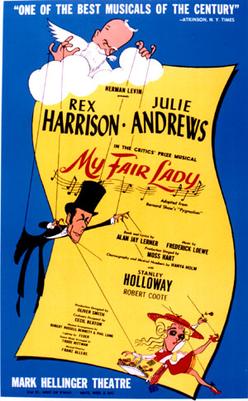
My Fair Lady is a musical with a book and lyrics by Alan Jay Lerner and music by Frederick Loewe. The story, based on the 1938 film adaptation of George Bernard Shaw's 1913 play Pygmalion, concerns Eliza Doolittle, a Cockney flower girl who takes speech lessons from professor Henry Higgins, a phonetician, so that she may pass as a lady. Despite his cynical nature and difficulty understanding women, Higgins grows attached to her.
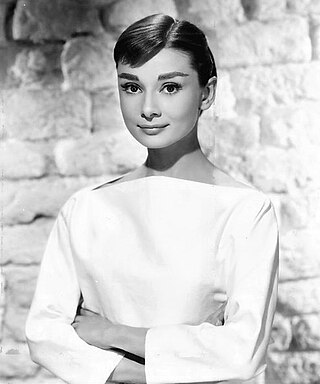
Audrey Kathleen Hepburn was a British actress. Recognised as a film and fashion icon, she was ranked by the American Film Institute as the third-greatest female screen legend from the Classical Hollywood cinema and was inducted into the International Best Dressed Hall of Fame List.

Dame Julie Andrews is an English actress, singer, and author. She has garnered numerous accolades throughout her career spanning over seven decades, including an Academy Award, a BAFTA Award, two Emmy Awards, three Grammy Awards, and six Golden Globe Awards as well as nominations for three Tony Awards. One of the biggest box office draws of the 1960s, Andrews has been honoured with the Kennedy Center Honors in 2001, the Screen Actors Guild Life Achievement Award in 2007, and the AFI Life Achievement Award in 2022. She was made a Dame (DBE) by Queen Elizabeth II in 2000.
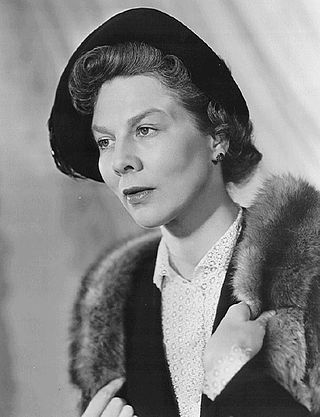
Dame Wendy Margaret Hiller, was an English film and stage actress who enjoyed a varied acting career that spanned nearly 60 years. Writer Joel Hirschorn, in his 1984 compilation Rating the Movie Stars, described her as "a no-nonsense actress who literally took command of the screen whenever she appeared on film". Despite many notable film performances, Hiller chose to remain primarily a stage actress.

Margaret Nixon McEathron, known professionally as Marni Nixon, was an American soprano and ghost singer for featured actresses in musical films. She was the singing voice of leading actresses on the soundtracks of several musicals, including Deborah Kerr in The King and I, Natalie Wood in West Side Story, and Audrey Hepburn in My Fair Lady, although her roles were concealed from audiences when the films were released. Several of the songs she dubbed appeared on AFI's 100 Years...100 Songs list.

Me and My Girl is a musical with music by Noel Gay and its original book and lyrics by Douglas Furber and L. Arthur Rose. The story, set in the late 1930s, tells of an unapologetically unrefined cockney gentleman named Bill Snibson, who learns that he is the 14th heir to the Earl of Hareford. The action is set in Hampshire, Mayfair, and Lambeth.
Eliza is a female given name in English, meaning "pledged to God" or "joyful."

Sally Ann Howes was an English actress and singer. Her career on screen, stage and television spanned six decades. She is best known for the role of Truly Scrumptious in the 1968 musical film Chitty Chitty Bang Bang. In 1963, she was nominated for a Tony Award for Best Lead Actress in a Musical for her performance in Brigadoon.
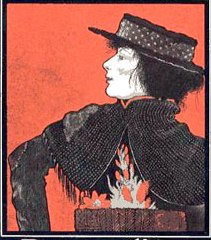
Pygmalion is a play by Irish playwright George Bernard Shaw, named after the Greek mythological figure. It premièred at the Hofburg Theatre in Vienna on 16 October 1913 and was first presented on stage in German. Its English-language première took place at His Majesty's Theatre in London's West End in April 1914 and starred Herbert Beerbohm Tree as phonetics professor Henry Higgins and Mrs Patrick Campbell as Cockney flower-girl Eliza Doolittle.
The 37th Academy Awards were held on April 5, 1965, to honor film achievements of 1964. The ceremony was produced by MGM's Joe Pasternak and hosted, for the 14th time, by Bob Hope.
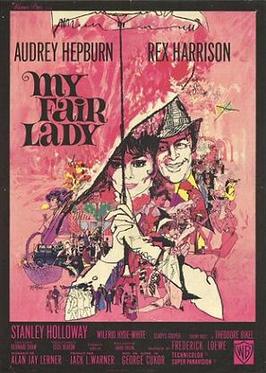
My Fair Lady is a 1964 American musical comedy-drama film adapted from the 1956 Lerner and Loewe stage musical based on George Bernard Shaw's 1913 stage play Pygmalion. With a screenplay by Alan Jay Lerner and directed by George Cukor, the film depicts a poor Cockney flower-seller named Eliza Doolittle who overhears an arrogant phonetics professor, Henry Higgins, as he casually wagers that he could teach her to speak "proper" English, thereby making her presentable in the high society of Edwardian London.

Pygmalion is a 1938 British film based on the 1913 George Bernard Shaw play of the same name, and adapted by him for the screen. It stars Leslie Howard as Professor Henry Higgins and Wendy Hiller as Eliza Doolittle.

"I Could Have Danced All Night" is a song from the musical My Fair Lady, with music written by Frederick Loewe and lyrics by Alan Jay Lerner, published in 1956. The song is sung by the musical's heroine, Eliza Doolittle, expressing her exhilaration and excitement after an impromptu dance with her tutor, Henry Higgins - in the small hours of the morning. In a counterpoint during the second of 3 rounds, two maids and the housekeeper, Mrs. Pearce, urge Eliza to go to bed, but she ignores them.

"Wouldn't It Be Loverly" is a popular song by Alan Jay Lerner and Frederick Loewe, written for the 1956 Broadway play My Fair Lady.
Lisa O'Hare is an English actress who has played Eliza Doolittle in My Fair Lady and the title character of Mary Poppins in the West End and UK stage. She more recently has appeared in several prime-time American television shows on TNT, ABC and NBC. She most recently starred on Broadway in the musical, A Gentleman's Guide to Love and Murder.
Pygmalion is a 1937 Dutch film, based on the 1913 George Bernard Shaw play of the same title, directed by Ludwig Berger.

Audrey Hepburn was a British actress who had an extensive career in film, television, and on the stage from 1948 to 1993. Considered by some to be one of the most beautiful women of all time, she was ranked as the third greatest screen legend in American cinema by the American Film Institute. Hepburn is also remembered as both a film and style icon. Her debut was as a flight stewardess in the 1948 Dutch film Dutch in Seven Lessons. Hepburn then performed on the British stage as a chorus girl in the musicals High Button Shoes (1948), and Sauce Tartare (1949). Two years later, she made her Broadway debut as the title character in the play Gigi. Hepburn's Hollywood debut as a runaway princess in William Wyler's Roman Holiday (1953), opposite Gregory Peck, made her a star. For her performance, she received the Academy Award for Best Actress, the BAFTA Award for Best British Actress, and the Golden Globe Award for Best Actress in a Motion Picture – Drama. In 1954, she played a chauffeur's daughter caught in a love triangle in Billy Wilder's romantic comedy Sabrina, opposite Humphrey Bogart and William Holden. In the same year, Hepburn garnered the Tony Award for Best Actress in a Play for portraying the titular water nymph in the play Ondine.
Anna O'Byrne is an Australian actress and soprano singer best known for her portrayal of Christine Daaé in Andrew Lloyd Webber's The Phantom of the Opera and the original Australian production of Lloyd Webber's sequel, Love Never Dies, for which she was nominated for a Green Room Award.
Jill Martin was an English actress and singer who made her career in West End theatre from the 1950 to the 2000s. Born in Redruth, Cornwall, she was educated at The Lawn School at St Austell and a song teacher at the school believed her to have an opera singer's voice. Martin debuted in the theatre in 1950 and was an understudy to several actresses. She was the only actor to appear in all three runs of My Fair Lady and produced a studio cast recording in 1966. Other musicals that Martin portrayed characters in were Fiddler on the Roof,Side by Side by Sondheim, The Baker's Wife,Les Misérables and Allegro.
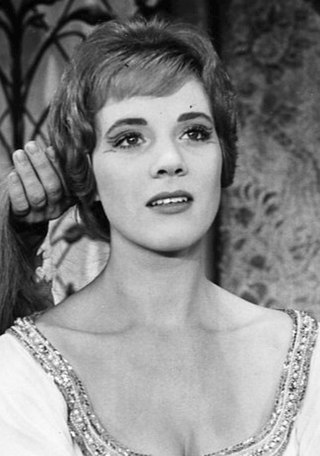
Julie Andrews is an actress, singer, and theatrical director who has had a lifelong career on the screen and stage. She made her film debut voice-dubbing the role of Princess Zeila in the 1949 animated film La Rosa di Bagdad. Her professional stage debut was in the musical comedy The Boy Friend where she played Polly Brown from 1954 to 1955. For this role, she won the Theatre World Award for Outstanding Broadway Debut in 1955. Then from 1956 to 1959, Andrews played Eliza Doolittle in My Fair Lady which earned her a Tony Award nomination, the first of three that she received during her career. After this success, she played the title role in the 1957 television special Rogers and Hammerstein's Cinderella. For this appearance, she received her first Primetime Emmy Award nomination for Outstanding Actress – Best Single Performance – Lead or Support. She received her second Tony nomination in 1961 when she originated the role of Queen Guinevere in Camelot. After this, she auditioned for the role of Eliza Doolittle in the 1964 film adaptation of My Fair Lady, losing the role to Audrey Hepburn. Instead, Andrews was cast as the title role in the 1964 musical film Mary Poppins. For this role, she received an Academy Award, a BAFTA Award, a Golden Globe, and a Grammy Award. Her next big success was portraying Maria Von Trapp in the 1965 musical film The Sound of Music. For her portrayal, she received a second Golden Globe, another Academy Award nomination and another BAFTA nomination.















